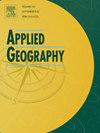Linking perceptions of ecological restoration projects’ impacts on ecosystem services and human well-being for achieving regional sustainability
IF 4
2区 地球科学
Q1 GEOGRAPHY
引用次数: 0
Abstract
Understanding how stakeholders’ perceptions of ecosystem service (ES) and human well-being (HWB) impacted by ecological restoration projects (ERPs) is crucial for achieving the Sustainable Development Goals. Howerver, few studies have explored how these impacts are perceived by stakeholders, particularly in terms of the link between ES and HWB from a human perception perspective. This study surveyed 203 residents of Dongting Lake area using a questionnaire that assessed 18 ESs and 9 HWBs to explore how personal characteristics influence perceptions of ERP impacts. It was found that the perception scores of 18 ES and 9 HWB were not less than 0, indicating that local respondents strongly recognized the positive role of ERPs in enhancing ESs and HWBs. Perception scores were negatively correlated with age but positively associated with education level and positive ERP impacts on individuals, while income level had no significant effect. Analysis of 18 ESs and 9 HWBs perceptions showed that 83.95% of relationships were significantly correlated, suggesting a comprehensive link between ESs and HWBs at the perceptual perspective. Future ERP policies should prioritize enhancing stakeholders’ perceived benefits of ERP impacts on both ESs and HWBs. This study highlighted the importance of linking perceptions of ERP impacts on ESs and HWBs to support stakeholders’ livelihoods and foster reginal sustainability.
将生态恢复项目对生态系统服务和人类福祉的影响联系起来,以实现区域可持续性
了解生态恢复项目(ERPs)如何影响利益相关者对生态系统服务(ES)和人类福祉(HWB)的看法,对于实现可持续发展目标至关重要。然而,很少有研究探索利益相关者如何感知这些影响,特别是从人类感知的角度来看ES和HWB之间的联系。本研究以洞庭湖地区203名居民为研究对象,采用问卷调查法,分别对18个自我评价指标和9个自我评价指标进行评估,探讨个人特征对ERP影响感知的影响。调查发现,18项营商环境评价和9项营商环境评价的感知得分均不低于0分,显示本地受访者强烈认同erp对提升营商环境评价和营商环境评价的积极作用。感知得分与年龄负相关,与受教育程度和ERP正向影响正相关,而收入水平无显著影响。对18个ESs和9个hwb感知的分析表明,83.95%的关系显著相关,表明ESs和hwb在感知角度上存在全面的联系。未来的ERP政策应优先考虑提高利益相关者对ERP对ESs和hwb影响的感知利益。该研究强调了将ERP对ESs和hwb影响的认识联系起来,以支持利益相关者的生计和促进区域可持续性的重要性。
本文章由计算机程序翻译,如有差异,请以英文原文为准。
求助全文
约1分钟内获得全文
求助全文
来源期刊

Applied Geography
GEOGRAPHY-
CiteScore
8.00
自引率
2.00%
发文量
134
期刊介绍:
Applied Geography is a journal devoted to the publication of research which utilizes geographic approaches (human, physical, nature-society and GIScience) to resolve human problems that have a spatial dimension. These problems may be related to the assessment, management and allocation of the world physical and/or human resources. The underlying rationale of the journal is that only through a clear understanding of the relevant societal, physical, and coupled natural-humans systems can we resolve such problems. Papers are invited on any theme involving the application of geographical theory and methodology in the resolution of human problems.
 求助内容:
求助内容: 应助结果提醒方式:
应助结果提醒方式:


